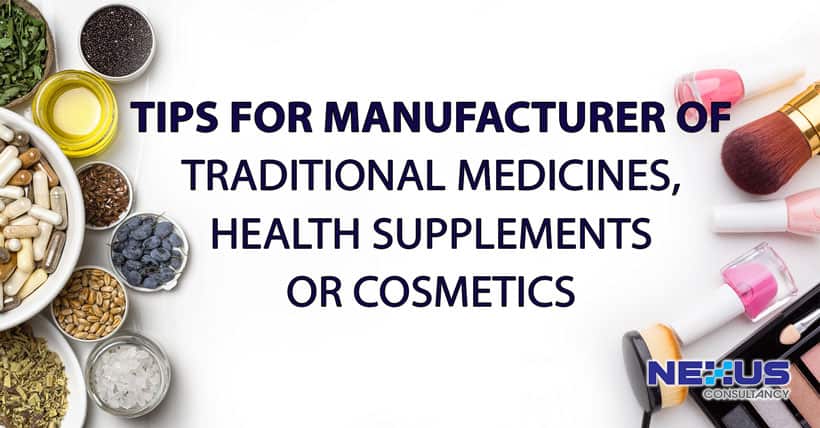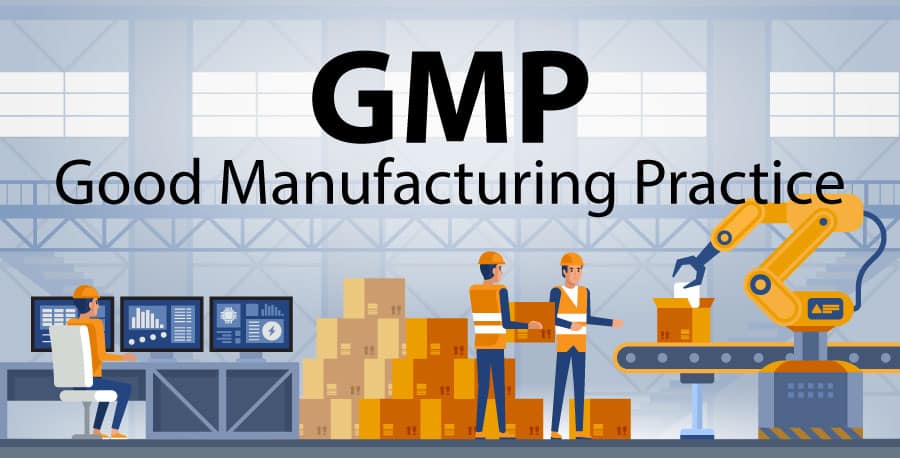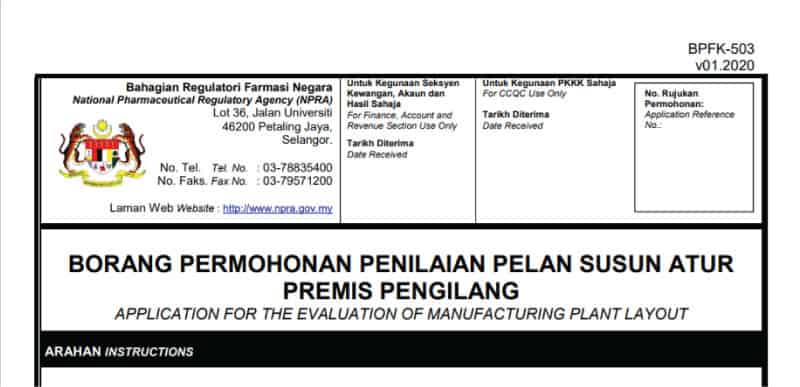
Guidelines on Good Manufacturing Practices (GMP Malaysia) for Manufacturer of Traditional Medicines, Health Supplements & Cosmetics
– by Bella Lim, Nexus TAC Management Consultant
7 minutes read

What is GMP?
Good Manufacturing Practice (GMP) is a system that ensures the manufacturing of any registered traditional products, health supplements and notified cosmetics are consistently produced and controlled according to the defined quality standards.
In general, a manufacturer for Traditional Medicines and Health Supplements (TMHS) / cosmetics products is required to:
- Ensure the building of the manufacturing areas are done in accordance with the approved layout and in accordance with GMP principles.
- Ensure the equipment (for both manufacturing and laboratory) and utilities are properly installed and functioning.
- Maintain the premises, equipment and utilities as well as the calibration of measuring devices.
- Establish the sampling plans, testing of materials and product.
- Establish a warehouse management program including receiving and storage of starting materials and finished products, as well as warehouse mapping.
- Ensure personnel involved in manufacturing activities are healthy, adequately trained and qualified.
- Have all the relevant procedures and records to prove that all activities are conducted accordingly.
According to the Control of Drugs and Cosmetics Regulations 1984, Regulation 7(1):
- …, no person shall manufacture, sell, supply, import, possess or administer any product unless –
a. The product is a registered product; and
b. The person holds the appropriate license required and issued under these Regulations.
The definition of ‘manufacturing’ includes:
- The making or assembling of the products.
- The enclosing or packing of the product in any container in a form suitable for administration or application, and the labelling of the container, and:
- The carrying out of any process in the course of any of the foregoing activities.
National Pharmaceutical Regulatory Agency (NPRA) is responsible to ensure that registered products/ notified cosmetics that are available in the market are safe, efficacious and of quality.
These registered products/ notified cosmetics are required to be manufactured in a manufacturing facility that is compliant with the current Good Manufacturing Practice (GMP) and Good Distribution Practice (GDP) requirements. Therefore, to ensure compliance, the GMP Section from Centre of Compliance and Quality Control (CCQC), NPRA will conduct various types of inspection onto these manufacturers.
The guidelines used for the inspection are as below:
| Category of Manufacturer | GMP Guideline | GDP Guideline |
| Traditional Medicine and Health Supplements (TMHS) | Guidelines on Good Manufacturing Practice for Traditional Medicines & Health Supplements, 1st Edition, 2008 | Good Distribution Practice, 3rd Edition, 2018. |
| Cosmetics | Annex 1, Part 10; Guideline for Cosmetic Good Manufacturing Practice, Guideline for Control of Cosmetic Products in Malaysia, February 2017 Rev.01 | |
| All the guidelines stated above can be downloaded from the NPRA website at https://npra.gov.my | ||
Prior to applying for pre-licensing / initial inspection, the manufacturer needs to ensure that the layout of the manufacturing facility is designed and planned according to GMP principles. The proposed layout along with the Application for The Evaluation of Manufacturing Plant Layout (BPFK-503) and supporting documents may be submitted to GMP Section, CCQC for evaluation. An approval letter of the proposed layout will then be issued when it is deemed satisfactory and this is the prerequisite of every request for pre-licensing / initial inspection.
The approval letter is required during the submission of the inspection request via QUEST 3 System. Therefore, the evaluation of manufacturing layout is compulsory for TMHS and cosmetic manufacturer.

The quality of manufactured products is highly regulated as it can pose negative health risks to consumers and even the environment. Poor hygiene practice, temperature-control, cross-contamination, and adulteration in any step of the manufacturing process are some examples of how a manufactured product that doesn’t follow GMP regulations can bring fatal consequences to consumers.
Many manufacturers get anxious when thinking about GMP, and some may view it as a complicated rule book rather than a positive resource designed to help businesses succeed. Indeed, GMP goes beyond just safety and contamination; it is about gaining awareness of and having the ability to control, all the various factors that influence the eventual quality of a finished product. When implemented, GMP supports continuous improvements that ultimately result in enhanced customer satisfaction and brand loyalty.
- Guidance Document for Preparation of Good Manufacturing Practice (GMP) Inspections on Traditional Medicines, Health Supplements and Cosmetics Manufacturers, 1st Edition, 1 July 2020.
- satyculture.com
- craftbase.com






